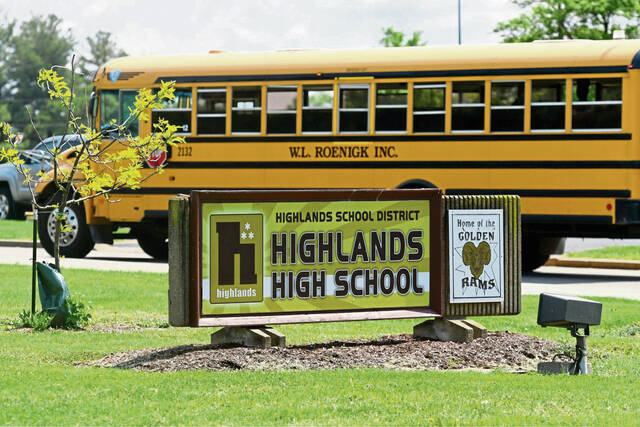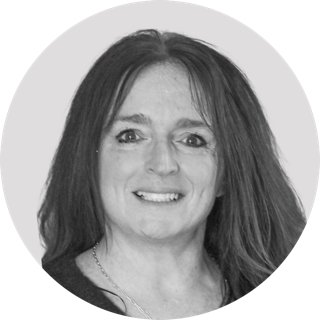https://triblive.com/local/valley-news-dispatch/highlands-region-3-race-decided-in-spring-but-voters-in-regions-1-and-2-have-multiple-options/
Highlands Region 3 race decided in spring, but voters in regions 1 and 2 have multiple options

Highlands School District voters will have an array of options in the upcoming election, with eight candidates seeking five positions on the board.
In Region 3, the race was all but decided in the spring when 18-year-old Democrat Eli Majocha and Democratic incumbent Kristie Babinsack won the top two nominations on both the Democratic and Republican tickets, where two seats are available. Region 3 stretches from Silverlake Park to the Freeport border.
In regions 1 and 2, however, stakes are high for the three available positions.
Voters in Region 1, which includes Fawn and most of Tarentum, will have their pick of Democrats Jenny Bosak and Christa Jones and Republicans Justin Kipp and incumbent Gene Witt.
In Region 2, newcomers Autumn Monaghan, a Democrat, and Shane Chesher, a Republican, will face off.
Region 2 includes Brackenridge and parts of Harrison.
Here are the candidates’ responses to questions posed by the Tribune-Review:
Region 1
Q: What is the district’s most pressing issue?
Bosak: “The utmost pressing issue at Highlands School District is bullying across the entire district.”
Jones: “I believe the district’s most pressing issue at this time is inclusion and rapport of all faculty and students. I think relationship-building is important at this time so we can dig into deeper issues.”
Kipp: “From all of the open-to-public meetings I’ve been able to attend, the most pressing issues that seem to come up are the bullying and safety concerns of district residents, and the concerning test scores that still seem to plague us. With the new budget passing with no new tax increases, I think the district is on the right track monetarily; time will tell.”
Witt: “Ultimately, public school districts are in the business of educating their students to be able to pursue their future goals in college or the workforce. Improving that education and subsequent test scores is the biggest issue in Highlands right now.”
Q: How would you solve it?
Bosak: “New policies need to be created which include adult bullying. Every person who steps foot anywhere in the district deserves to walk into a bully-free zone. Creating ways for adults and students to report bullying is a must. There is a no-cellphone policy which limits the use of Safe2Say.
“If a student uses their Chromebook to report, anyone around can see that student’s screen. To me, that’s not anonymous. They can also report to administrators, but not all students are able to do so for personal reasons or reasons unknown to others.”
Jones: “Working with the administration to incorporate trainings that cater to building rapport and inclusive practices. Holding the faculty accountable for following the suggestions in the trainings.
“You do this in staff meetings and supervisions. Then, reach out to the students in small groups to see if they notice the changes. Once trust is incorporated, we can work on core issues.”
Kipp: “Many policies regarding discipline/safety are mandated on a state and federal level. We need more attention at home, parents need to be more involved in their kids’ schooling and not put 100% of it on the teachers and the district.
“I nor any of the school board directors can solve the issues with the test scores personally. Good teachers and good parenting will make your kids successful and get these test scores where they need to be. Academics, discipline, and safety are at the top of my list to fight for. I promise that decisions made by the district would have my full attention.”
Witt: “When I joined the board four years ago, the district was in chaos organizationally and financially, and had seen test scores sink. We put a five-year plan in place, called Framing the Future, and the finances are in order with a strong administration in place.
“Losing two years of face-to-face instruction due to covid set all districts back, but we are poised to see test score improvement. Now we need to see the plan through to completion to give our students the highest quality education possible.”
Q: Do you feel that school boards are being politicized by national issues making their way into the decision-making at the local level?
Bosak: “I feel like national politics are making their way into school boards across the nation and Highlands. It’s important for the school board to come together to address every concern in a professional and caring manner. The school board job is to help bring everyone together as best as possible. Every voice matters.”
Jones: “National politics slip their way into everything. The question is, how do we as a community handle it? I would like to see the discussions take place in a safe environment and then proceed on with the needs of the school and community.”
Kipp: “I definitely think national politics are playing a huge part in all areas of our lives. Whether it’s stream media or social media, twisted facts and agendas are being forced on Americans despite how wrong or immoral they are. Thankfully I personally do not feel this has had a hard impact on our school district as of yet.
“I’m sure at some point we are going to face them, but the residents need to also understand a lot of the policies that are mandated into the school districts are by state and feds, not the board itself.”
Witt: “While this current board has a lot of diversity across the political spectrum, I think we’ve generally put those national issues aside and focused on our students. I do think they are present and have flared up occasionally, and I also think they are constantly right under the surface.
“While school directors are elected officials and are by definition politicians, I don’t see myself in that light. I am concerned that the new board may have a much more political flavor to it.”
Q: What skills would you bring to the board?
Bosak: “I’ve volunteered for 11 years now throughout the district. I can relate to others who have been bullied. I will bring strength and drive to better our district all around. Working as a registered nurse for over a decade has taught me how to prioritize duties and manage difficult situations within split seconds. I’m ready to take this possible opportunity and make Highlands a much better and safer environment for everyone in the district and throughout the community.”
Jones: “I would bring an inclusive approach. I want to see everyone in the community represented and heard.”
Kipp: “As a business owner I can bring some knowledge regarding financial prioritizing and budgeting, contractual agreements and negotiations, and insight on decisions regarding building and grounds issues. Being in a trade industry I would like to instill more emphasis on the offering of trade options for graduates who don’t wish to pursue college after graduation.
“Our children need to be prepared no matter what direction they choose. I have no agenda other than making sure the right thing is being done by our children, faculty and the residents of this district. I will be their voice and hand.”
Witt: “My biggest asset as a school director is my problem-solving skills and my ability to use that in a group setting. Any school director has no individual power — the board’s power is as a collective. I’ve been a part of dozens of problem-solving teams in my day job, and, to be effective, team members have to be able to brainstorm and be open to all possible options.
“That I’m able to bring that to the board with a business focus has made me a significant asset to the board.”
Region 2
Q: What is the district’s most pressing issue?
Chesher: “Without a doubt, education. Knowledge is power, education is key and should always be our primary focus.”
Monaghan: “I can’t pick just one pressing issue. The biggest issues, in my opinion, are behavior issues among students, truancy and the rate of disciplinary actions in relationship to the effectiveness of discipline. We should be seeing improvements.”
Q: How would you solve it?
Chesher: “It’s a complex issue and will take a coordinated effort, a problem that cannot be fixed by myself. I believe progress is being made, but we need to be innovative as much as possible. I would like to incorporate more hands-on education and more real-world skills into the curriculum.”
Monaghan: “The school should do more to tap into outside services and resources available to the district, as well as improve relationships with the community and staff, while valuing and acting on feedback. Planning for improvements in the district should be monitored, reviewed and the administration should be held accountable.”
Q: Do you feel that school boards are being politicized by national issues making their way into the decision-making at the local level?
Chesher: “I do not believe that politicization has crept into the school board but could be possible to happen on both sides of the aisle. I do believe that politics should not be influenced by your decisions as a school board member.”
Monaghan: “I do not think the board is overly politicized right now, but it definitely has the potential to be in this election cycle. We need to be careful with our votes. We have a responsibility to represent every person living and learning in the district regardless of political affiliation.”
Q: What skills would you bring to the board?
Chesher: “I do not believe that I have a particular set of skills, other than a general knowledge of the community, school district and school board. I will also bring principle and a positive attitude to make positive change that will not be wavered.”
Monaghan: “I will bring communication and advocacy skills to the school board.”
Copyright ©2026— Trib Total Media, LLC (TribLIVE.com)
